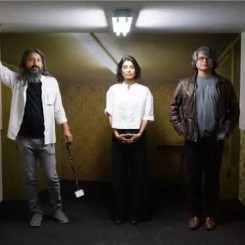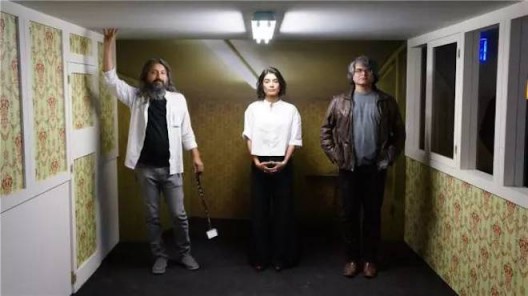[Release]
After extensive recommendations and careful selection by members of the PSA Academic Committee and the 11th Shanghai Biennale Academic Committee, the Indian artist/curator group Raqs Media Collective has been appointed the chief curator for the 11th edition of the Shanghai Biennale, which will be open on November 11th 2016 until March 12th 2017 at the PSA.
As the first international contemporary art biennial on the Chinese mainland, the Shanghai Biennale was launched in 1996. Since then, during its 19 years of development, the biennale has maintained high levels of artistic and intellectual standards while consistently analyzing the evolution of urban culture in the international context. It has also grown to become a significant platform for the exhibition of global contemporary art and for discourse.
The 11th edition of the Shanghai event will emphasize the possibilities of South-South dialogue within the current scenario of a highly interconnected world. In doing so it will seek to present artistic and discursive visions that go beyond and challenge the conventional division of the world between ‘East’ and ‘West’. The Raqs Media Collective, who straddle diverse roles in creative and curatorial work and research processes, envisage the forthcoming biennale to be a destination for many different kinds of exploration and investigation as well as a launching pad for new visions and ideas.
The title chosen by Raqs Media Collective for the 11th Shanghai Biennale is “Why Not Ask Again? Maneuvers, Disputations&Stories”. This phrase, inspired by Raqs’ reading of the Indian New Cinema movement pioneer RitwikGhatak’s film Jukti, TakkoaarGappo(Arguments, Counter-Arguments & Stories,1974) anchors their curatorial design.
Towards the end of the film, the protagonist, an alcoholic intellectual, falls in with a band of fugitive rebels. To their proposals and counter-proposals, their arguments and counter-arguments, the protagonist offers his stories, his reminders, and his incandescent confusions. For Raqs, the triad – Arguments, Counter-arguments and Stories – is like the three-body problem in physics (Raqs had an intensive discussion on the Sci-fi triology The Three Body Problem). Two bodies in space interact in a manner that is predictable, with the dynamics of their mutualgravitational forces governing how they rotate around each other. The moment a third body is introduced things get complicated and unpredictable. Suddenly, it appears as if everything can change.
Raqs see the 11th Shanghai Biennale unfolding as a structure rich with trigger mechanisms that respond to different kinds of audience expectations and perceptions by offering the pleasurable surprises inherent in fables and story-telling and a playful deployment of questions and arguments. With these, they hope to offer a matrix of heterodox and non-doctrinaire connections between images, ideas and expressions – between art, literature and philosophy. While Raqs are committed to a biennale that engages its audience intellectually, they are also clear that they do not see it as a diversion for ‘insiders’, or those who think they are ‘in the know’. All they demand of their audience is the willingness to be curious and passionate about the complexity and richness of contemporary life.
The exhibition will act in a mode that Raqs calls “critical myth”. Raqs is aiming, not just at a collection of art works, but at an artistic and aesthetic experience that is alive, that has the capacity to change and be responsive to human presence in affective, emotional as well as intellectual ways. They see the role of the artist as being akin to a figure in a fable who transforms the telling of the story he is in by presenting riddles and engines, by asking necessary, difficult and engaging questions.
It is this that leads Raqs to ask, “Why not ask again? Why not begin at the beginning, or the end, or the middle of a question, or a desire (because the task of ‘asking’ can stand both for the posing of a question as well as for the awakening of a desire)?” As curators they seek to inflect their proposal with speculative and philosophical strands of thought, particularly within non-western contexts and fabulist traditions. Their invitation to artists is nothing short of a provocation to respond to the task of a re-imagining of the world. Raqs believes that such maneuvers can invite the public of the biennale to undertake close encounters with the pulses of the myriad contemporary sensibilities that are surging through our world.
About the Chief Curator
Raqs Media Collective was founded in 1992 by Jeebesh Bagchi (New Delhi, 1965), Monica Narula (New Delhi, 1969) and Shuddhabrata Sengupta (New Delhi, 1968). Raqs is a word in Persian, Arabic and Urdu and means the state that “whirling dervishes” enter into when they whirl. Raqs follows itself declared imperative of ‘kinetic contemplation’, and enjoys playing a plurality of roles, often appearing as artists, occasionally as curators, sometimes as philosophical agent provocateurs. They make contemporary art, have made films, curated exhibitions, edited books, staged events, collaborated with architects, computer programmers, writers and theatre directors, and have founded processes that have left deep impacts on contemporary culture in the world with their originality and scope.
As artists, Raqs has presented works at most of the major international shows, including Documenta (2002), the Venice Biennale (2003,2005 & 2015), and the Shanghai Biennale (2010). The members of Raqs were co-curators of Manifesta 7 – the European Biennial of Contemporary Art (2008) in Bolzano and INSERT2014 in Delhi.


